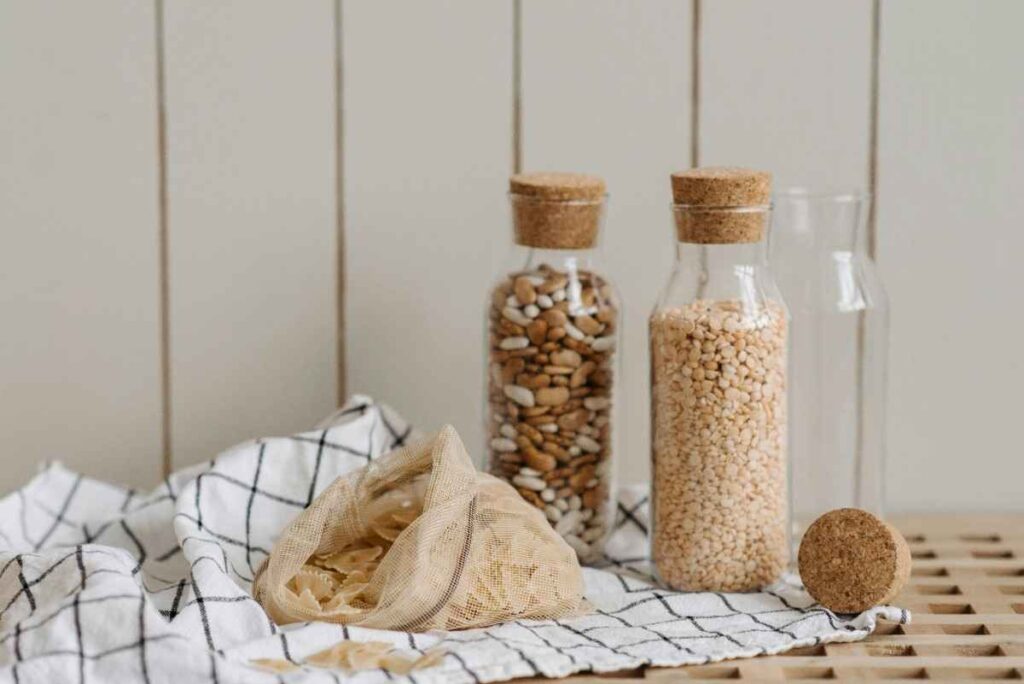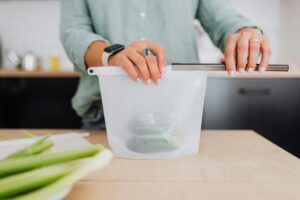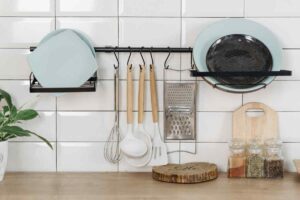
A sustainable lifestyle doesn’t just do good for the environment—it does good for your wallet too. Starting your eco friendly journey starts in the kitchen. Waste generation from the heart of any home: the kitchen, is extensive but change can be made. This zero waste kitchen essentials guide will show you how to have zero waste in your kitchen while still meeting your needs for functionality and of course, style.
What Makes Zero Waste Kitchen Essentials Great?
An average American household produces an average of 4.4 pounds of garbage per day, and a pretty large portion of that garbage comes from the kitchen. This waste also includes single-use plastics, food packaging and disposable cleaning products. By transitioning to zero-waste kitchen essentials, you can:
Reduce landfill waste: They keep the amount of disposable products at a minimum.
Save money: These are cost effective over time, and durable eco friendly options.
Support sustainability: However, many of these zero waste products are made from renewable materials.
To create a sustainable, waste free kitchen, let’s look at the must have essentials.
1. Reusable Silicone Food Storage Bags
Give single use plastic bags goodbye with reusable silicone food storage bags. If you’re looking for durable airtight bags, Stasher is a great brand offering bags for storing snacks, leftovers or even for storing fresh produce.
Why It’s Essential: Don’t use hundreds of disposable plastic bags — one silicone bag can replace.
Pro Tip: There are also different sizes to fit different storage needs such as freezer prep or on the go snacks.
2. Beeswax Wraps for Wrapping and storing Food
Kitchen plastic cling wrap is notorious for being a huge source of kitchen waste. An excellent alternative to beeswax wraps are made with organic cotton coated with beeswax, resin, and jojoba oil.
How to Use: Roll them around some fruit or veg or put them on sandwiches, and they make great bowl covers.
Why It’s Eco-Friendly: Beeswax wraps are washable, and biodegradable, they’ll last up to a year with correct care.
3. Organic Waste Compost Bins
A countertop compost bin turns your food scraps into nutrient rich compost. Compact, odor resistant, and perfect for small kitchens, these bins.
Benefits:
Organic waste is diverts from landfills.
Acts as compost for gardens or houseplants.
Zero-Waste Tip : Make cleaning easy and mess free by using compostable liners.
4. Glass Storage Containers
Glass is easily reused, durable, and BPA free. Dry goods, leftovers, meal prep items are all they’re great for storing.
Why It’s Better:
It is also good to use in microwaves and ovens.
This won’t stain or hold odors like plastic containers.
Tip: Check for bamboo or silicone lids to find a fully eco friendly option.
5. Stainless Steel Water Bottles
Replace that annoying single use plastic bottle with a pure stainless steel water bottle. Hydro Flask or Klean Kanteen are durable while options like these help insulate beverages keeping them hot or cold.
Why It’s a Must-Have: Plastic bottles disposal is stopped and you are always stocked with your need for water.
Eco-Friendly Bonus: More and more brands now offer customization, so your bottle becomes uniquely yours.
6. Cloth Napkins
Not only does switching to cloth napkins save you money, not to mention time, it makes your table that much more elegant. Made of washable, reusable fabric with lots of colors and patterns available.
Why It’s Zero-Waste: It gets rid of the need for disposable paper napkins.
Care Tip: If you have stains you can choose darker colors or a pattern to hide them.
7. Bamboo Utensils
Bamboo utensils are compostable, lightweight and durable, and plastic cutlery tend to end up in landfills or oceans. A bunch of them have forks, knives, chopsticks among other things that are suited for home or travel.
Why It’s Sustainable:
Bamboo is a renewable fast growing resource.
The utensils are also biodegradable.
Pro Tip: Have a set in your bag to keep to take out when dining out or when going on a picnic.
8. Reusable Coffee Filters
Reusable coffee filters comprised of stainless steel, or organic cotton are coffee lover’s eco friendly alternatives to the paper single use filters.
Eco Impact: In the long run it’s cheaper as it saves paper waste.
Flavor Boost: The fact that so many users are reporting richer tasting coffee when using the reusable filters is very encouraging.
9. Wooden Dish Brushes
Get rid of synthetic sponges by replacing them with wooden dish brushes made from natural fabrics as well. Scrubbing is their job and they can be composted at the end of their life.
Zero-Waste Perk: There are many brushes with replaceable heads, so waste is further reduced.
Bonus: They’re naturally antibacterial and, unlike synthetic alternatives, they last longer.
10. Bulk Bin Bags
Grains, nuts, or spices from bulk sections only leave room for bulk bin bags made out of reusable cotton or mesh. With these bags, we remove the need for plastic packaging.
How to Use: Before filling your bag, weigh it so you don’t overcharge at checkout.
Why It’s Essential: Allows zero waste shopping and cut down on single use plastic.
11. Cast Iron Pans
There is nothing easier to deal with than a cast iron pan, they will last a lifetime and can replace the nonstick pans that are full of toxics.
Eco-Friendly Aspect: Completely recyclable, durable.
Maintenance Tip: It is recommended that you season your pan regularly, so that surface is nonstick.
12.Sustainable Dish Soap Bars
Say goodbye to plastic bottles with solid soap dish bar. Liquid soaps last shorter than these bars, which are very concentrated!
Why It’s Better:
Usually free of unwanted chemicals.
Packaged in plastic free packaging.
Use Tip: Use a dish brush, wooden or plastic.
13. Reusable Produce Bags
Reused, lightweight, and washable produce bags fit best for fruits, vegetables and bulk items. They are a simple swap that is hugely reducing plastic waste.
14. Linen Towels
Instead, start to use absorbent coiron towels instead of paper towels. Quick drying and reusable, they give a rustic charm to your kitchen.
15. Eco friendly Cleaning Products
Search for cleaning solutions using biodegradable and plant based ingredients. A few good products exist from brands like Method and Seventh Generation that are low impact on the environment.
16. Mason Jars
Mason jars are kitchen MVPs. Ferment vegetables, or use them for storing food, or organizing utensils.
17. Ceramic or Metal Straws
Farewell, plastic straws, and hello to robust, refillable detritus spacers in ceramic or stainless steel.
18. Refillable Spices Jars
Buy in bulk of spices and store them in refillable jars, instead of using the packaging.
19. Bread Bags
Save homemade bread for a couple of days to 3 weeks in linen or cotton bread bags without plastic.
20. Zero-Waste Ice Cube Trays
Durable, flexible and an alternative to disposable plastic trays, silicone ice cube trays are a game changer.
End Note
Going zero waste is not just an eco move, it’s a lifestyle upgrade. Picture you’re sipping your coffee free from guilt and you saved a tree from being used each time you have your coffee with a reusable filter. Or showing off your beeswax wraps at your next party like the green celeb you are. With that we remember sustainability is not about perfection, just progress, because progress means one bamboo utensil at a time.
FAQ
- What they are zero waste kitchen essentials?
Zero Waste kitchen essentials mean reusable, compostable or recyclable products so they don’t get trashy, like beeswax wraps and glass containers. - What does zero waste product save you money?
By reducing need to use disposable items, they save money over time on expense rolling in. - What zero waste kitchen essentials can I buy in the U.S.?
There are so many products at eco friendly retailers such as EarthHero, Package Free Shop, and even Amazon. - Are zero waste products durable?
Most zero waste products are high quality, long lasting materials like glass, silicone, or stainless steel. - Can we really live a zero waste kitchen? And if so, how do I start with it?
Swap small things with reusable bags, silicone storage, etc and when it’s time replace disposable items. - Are these zero waste kitchen utensils family and planet safe?
Absolutely. Landfill waste are reduced, single use plastics are reduced and support sustainable practices.



